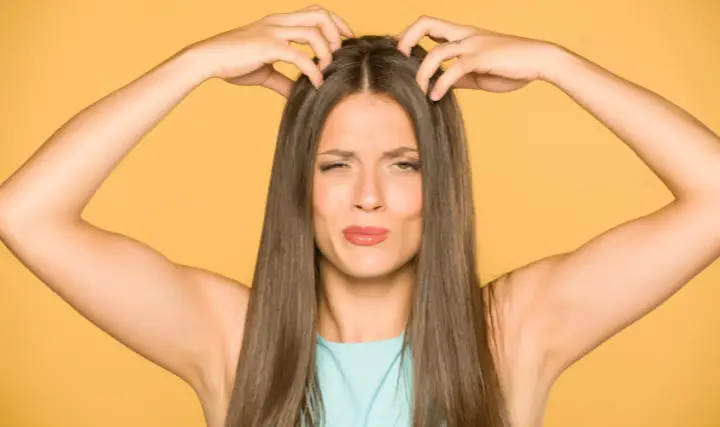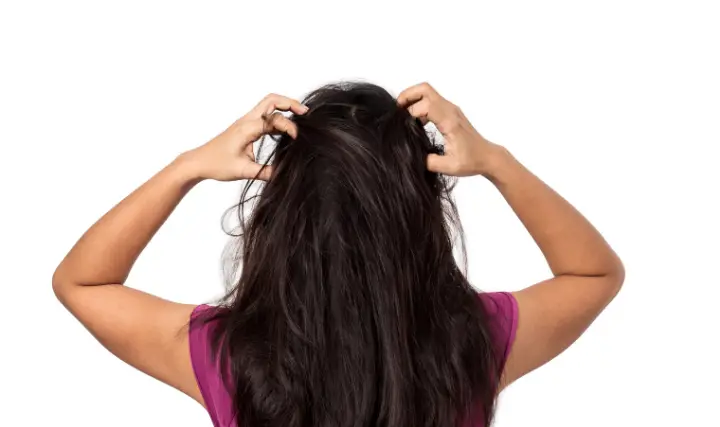Dandruff normally appears between 10-25 years of age and spontaneously improves towards 45-55 years of age; however, it can persist until old age.
It is caused by an accelerated turnover of epidermal cells that, due to the increased speed of migration, are unable to reach complete maturation before detaching.
Therefore, white or grayish scales (clusters of horny cells) are formed, localized in scattered patches or, more often, diffusely distributed over the entire scalp.
Itching is scarce or absent. Due to the irregular arrangement of horny cells in dandruff, unlike what is commonly believed, the stratum corneum is more permeable than that of a normal scalp and therefore it must be taken into account to avoid the undesired absorption of pharmacologically active substances applied locally in lotion.
Read: Can You Kill Lice With Apple Cider Vinegar

How To Relieve Itchy Scalp From Extensions
The causes are unknown, and, in particular, a hypothetical “androgenic” influence suggested by some authors remains obscure. Even the often cited responsibilities of the digestive system and especially of the liver have no scientific basis.
More interesting is the fact, scientifically established, that in the scales and in the hair of subjects with dandruff is often present in massive quantities a mycete (fungus), the Pityrosporum ovalis, whose pathogenetic role has never been definitively clarified.
However, dandruff can also be present in the absence of high amounts of Pityrosporum.
Therefore, the most common opinion is that it is not the fungus responsible for dandruff but that, on the contrary, in many cases a scalp with dandruff is a favorable terrain for its development.
Clinically, a distinction is made between dry or simple pityriasis, in which the scalp is covered by small, very fine, easily detachable scales that cover clothes with normal skin and modest itching, and fatty or steatoid pityriasis, in which larger, greasy, and yellowish scales adhere to a scalp that is sometimes slightly erythematous and oozing.
Read: How To Wash Synthetic Hair Extensions easily

How To Stop Itchy Scalp With Hair Extensions
Do you feel like you’re going crazy with an itchy scalp? Would you like to spend the whole day scratching your head?
Itchy scalp is a very common problem, especially in adulthood and is nothing more than the direct consequence of an inflammation of the skin.
The itching can last for a different period of time depending on the cause; it is therefore important to understand the origin of the problem in order to avoid possible complications such as lesions on the scalp itself.
You should take time to understand the origin of the problem in order to avoid possible complications such as lesions on the scalp itself.
It is also important to remember that the scalp deserves the same attention and care as the skin of the face and body.
It is necessary to always choose the most suitable products for the scalp, which must be gentle and never irritating.
But let’s see together what are the symptoms, causes, and remedies of this annoyance.
The symptoms of itchy scalp
From what problems can the scalp be affected? Severe itching, accompanied by intense burning can also affect the skin.
However, itching on the head almost never occurs alone. Often, in fact, there are other symptoms that accompany this annoying disorder. Below, find the main ones:
- Burning;
- Pustule formation;
- Pain;
- Redness and inflammation;
- Desquamation;
- Hair loss and thinning;
- White dots (lice eggs) adhering to the root of the hair, especially affecting the head area behind the ears and behind the nape of the neck;
- Cracked skin on the scalp.
We have listed the symptoms that accompany an itchy scalp. Now, it’s time to look at the possible causes.
The causes of an itchy head
The causes can be different and very often, since they are causes of pathological origin, it is advisable to consult a dermatologist to understand how to deal with them in the most appropriate and efficient way.
Let’s see below the main causes of an itchy head.
1. Psoriasis
In several cases, the root cause of itchy scalp is pathological. It may be psoriasis, an inflammatory disease affecting the immune system, but also infections of various kinds.
2. Bacterial and fungal infections
Both bacterial infections, caused by bacteria infecting the hair follicle, triggering an inflammatory reaction called folliculitis, and fungal infections, caused by fungi that colonize and infect the scalp, causing ringworm for example, are responsible for severe itching.
3. Dandruff
One of the most common causes of itching is also dandruff, often caused by seborrheic dermatitis. An excessive production of sebum by the sebaceous glands present at the level of the scalp, in fact, leads to the formation of dandruff and, therefore, a strong itching sensation.
4. Dryness of the skin
Irritation can also be triggered by excessive dryness of the skin, caused by cold, heat or environmental pollution.
5. Allergies
Allergies and food intolerances can also be the cause of itching: chemical dyes that we use to give new colors to our hair, basic or acid substances used for beauty treatments, are often the cause of strong allergies, which manifest themselves in persistent itching on our scalp.
6. Head lice
If the cause is not pathological, the itching could be caused by external factors.
For example, lice, small insects that feed on our blood and lay their eggs on our scalp.
These parasites are extremely contagious and difficult to remove, as they (but also the eggs) adhere very strongly to the root of the hair.
7. Stress
In addition, the hectic pace of our lives is often a cause of great stress for our bodies and our hair, and one of the consequences of this, in addition to the strong weakening of the hair shaft, is a very itchy scalp.
8. Sunburns
Even the sun is often too strong for our skin. And excessive exposure can cause sunburn, irritation and inflammation especially on the scalp, on which UV protection is generally not applied, resulting in severe itching.
So how to deal with an itchy scalp? Let’s see together the most effective remedies!
Remedies for an itchy scalp
The ways to intervene to combat itching are varied and depend on the underlying cause of your problem.
In the case of pathological causes, it is always advisable to consult a dermatologist to understand how to deal with them in the most appropriate and effective way.
In general, it is always good to keep in mind that nutrition has a protective effect on the scalp, so a healthy diet helps to make our hair stronger.
Iron, vitamins and amino acids are fundamental.
Seasonal Changes
In times of change of season, however, can be useful dietary supplements based on iron, zinc, biotin, methionine and cystine, substances that help the natural growth of hair.
If the cause is irritation due to overly aggressive products or excessive exposure to the sun, then choose a shampoo that is gentle, non-irritating and free of aggressive substances such as certain surfactants or foaming agents.
The RestivOil shampoo line, formulated to take care of your hair without attacking it.
It is an excellent choice in cases like these.
And that’s not all: its cleansing must be frequent, especially in periods when environmental pollution and weather conditions weigh hair down. Hygiene is fundamental to having a healthy scalp.
Washing your hair every day is not wrong, as people often think. On the contrary, the scalp produces sebum continuously, so it is good to rinse it daily. The only caution is to use a non-aggressive shampoo.
To fight an itchy head, you have to take care of your hair
We have seen, therefore, that our scalp can be affected by various disorders and annoying itching. This is a consequence of diseases or aggressive external agents.
Taking care of it every day by choosing gentle, non-foaming and non-aggressive products is essential to keep your hair healthy and to minimize these annoyances.
Natural remedies for scalp psoriasis
It seems that aloe vera is one of the most useful natural remedies for scalp psoriasis.
In fact, this plant has a soothing effect. It helps to calm the itching and a moisturizing and anti-inflammatory effect.
Lavender essential oil is also presented as a natural remedy that has the benefit of soothing redness and itching.
Among the oils, we also recommend tea tree essential oil. It has antibacterial properties, and jojoba oil, which has an emollient, protective and anti-inflammatory action.
In addition, scalp compresses for psoriasis can also be valuable remedies to improve the problem.
For example, the shea butter compress, which is applied by keeping it on the skin all night long, is very useful to moisturize the scalp; or, again, the almond oil compress thoroughly cleanses the scalp and leaves the hair soft and silky.